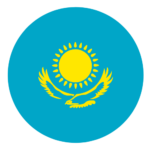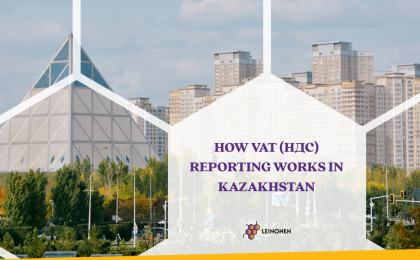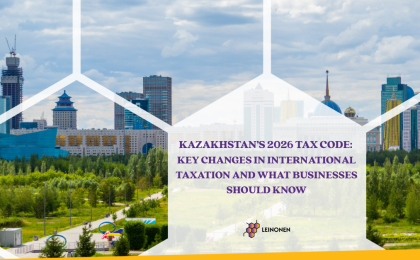Despite feeling the economic effects of neighbouring Russia’s invasion of Ukraine, Kazakhstan’s economy has proved itself to be resilient and ever-growing. In fact, according to the World Bank, its GDP is set to increase by 4.5-5% in 2025*. Combined with its ideal location nestled between eastern Europe and central Asia, this makes Kazakhstan a nation brimming with untapped business opportunities.
Employee Rights and Terms of Contracts
In Kazakhstan, employment can be established as a ‘contract’ or an ‘agreement’, but contracts are the most widely used. An employment contract usually covers a specified period of a year or two, and salary payments are made monthly or twice monthly. The standard working week is 40 hours spread across five or six days, and employees are entitled to 24 days minimum annual leave, plus paid sick leave and maternity leave.
Dismissal
Employee rights in Kazakhstan are extensive, and dismissal typically includes one to three months (or another mutually agreed amount) of severance pay.
Exceptions to this that may allow for termination without notice include:
- Liquidation
- Production reasons
- Health and safety violations
- Dismissal during probationary period
- Intoxication
- Violation of company rules
- Absence
On the other hand, there are some employees who cannot be fired, including:
- Pregnant women
- Mothers with a child under the age of 3
- Single mothers with a child under the age of 14
- Employees on sick leave or vacation
Work Permits in Kazakhstan
Obtaining work permits in Kazakhstan is bureaucratic and can be especially difficult if several permits are needed. This is due to limits on the number of permits allowed per company and county. Acquiring a work permit is easiest for CEOs, managing directors and deputy directors.
Foreign nationals applying for a work permit must also apply for a work visa at a local or foreign Kazakh embassy, and this will take around 10 working days to process. A foreign manager of a branch or representative office does not need a work permit, but does need a valid local tax number (INN).
There are two main types of work permit in Kazakhstan:
Paid work permits
- Cost the employer US$950-1729 depending on employer’s activity and applicant’s category (e.g. managing directors and deputy directors are category one).
- Searching for an employee in the local labour market is not mandatory, and there are no obligations to train Kazakh citizens or create new jobs for locals.
Work permits for intra-group secondees transferred from World Trade Organization (WTO) member countries
- Require a mandatory primary search for an employee in the local labour market.
- Employer is obliged to train Kazakh citizens or create new jobs for locals.
Employing Locally in Kazakhstan
Because applying for work permits in Kazakhstan can be a complex, time-consuming and costly process, it often makes sense to hire staff from the local market.
Where can you Find Local Employees in Kazakhstan?
Finding employees in Kazakhstan can be challenging. While potentially useful for roles with a well-defined hard skillset, the recruiting field is not well developed. Posting job ads on websites like hh.kz only costs a small amount and can get you a lot of visibility, but you will likely receive many applications from unqualified candidates. Contacting previous employers is highly recommended.
Often, skills and experience do not match ambition, but hiring someone with the right attitude and moulding them to excel in your field can be beneficial for both employee and employer. But due to the high likelihood of poor applications, the best way to find staff in Kazakhstan is often by making enquiries through your own contacts.
Work Culture in Kazakhstan
Work culture in Kazakhstan is influenced by Russia and Asia. Hierarchy typically plays an important role in the workplace. Strong leadership is important, and leaders are expected to take on most of the risk, responsibility and stress within a team.
Community spirit is important in Kazakhstan’s culture, so gestures like organising social events and celebrating staff birthdays are appreciated. Employees can easily change jobs for a small increase in salary, so helping your team enjoy a positive work culture is key to employee retention.
Where to set up Your Business
If you are planning on setting up a company in Kazakhstan, there are a few things to consider when deciding on your geographical base. These include convenience of travel connections, profitability, and ease of recruiting. Recruiting personnel is often easiest in Almaty, and while its airport is very congested, its 2024 expansion should allow more flights to enter.
How can Leinonen Help?
Thanks to its steadily growing economy, fast developing business culture and connections to central Asia, more and more companies are noticing the up-and-coming Kazakhstan market. But managing employment and payroll in Kazakhstan does not come without its challenges. Processes like applying for work permits, managing contracts and handling tax can be complicated, with ever-changing regulations for foreign businesses to navigate.
Leinonen’s accounting, payroll, tax and financial management services can take care of the intricacies, so you can focus on your company’s mission and growth stress-free. With 34 years in business and over 1500 satisfied customers spanning 11 countries, we have been a trusted name in accounting since 1989. Get in touch to find out what we can do for your growing business.





